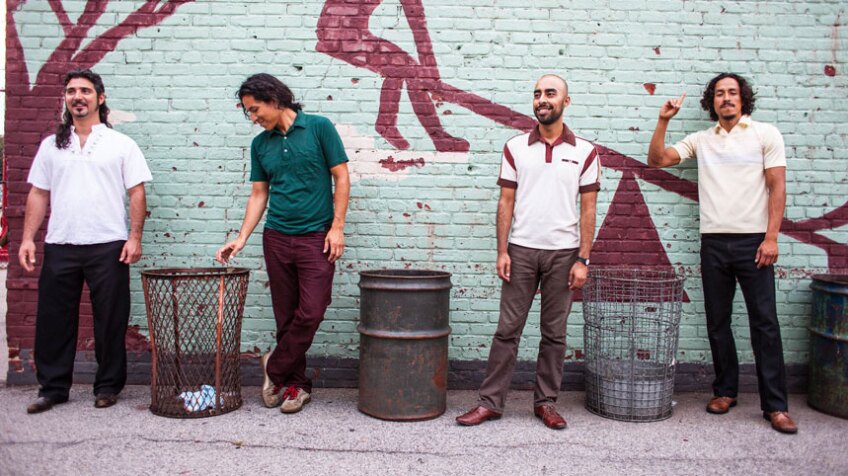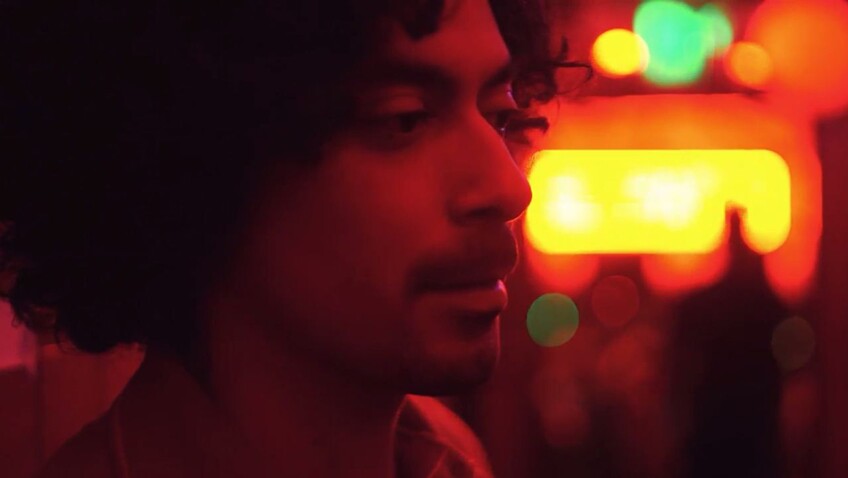Chicano Batman: A Soul Band with a Rhythmic Vision of the World

Chicano Batman was born in Los Angeles but its members have roots throughout Mexico, Central, and South America. Their music and their style has a vintage feel, influenced by cumbias, romantic Spanish ballads from the 1960s and 1970s, the Brazilian Tropicalisimo movement, psychadelia, and funk, among other genres that come together to produce the summertime, feel-good, "musica para planchar" style that their multicultural audience can't get enough of.
Although the band croons about love and its music is not explicitly political, its logo combines the symbol of the United Farm Workers union founded by Cesar Chavez in 1962, with the Batman logo, to form a combined political/pop-cultural symbol. With a hybrid of sounds drawn from all corners of the Spanish-speaking world, Chicano Batman songs honor the musical icons of their past and tell the stories of the working class. The video for "Cycles of Existential Rhyme," the title song on the band's 4th album, is an ode to Chicano Batman's hometown, showcasing scenes from La Cita Bar and the string-light illuminated stretch of 4th Street that is home to Bar 107, among other classic locations in downtown Los Angeles.

"Border Blaster" caught up with the band fresh off their tour with Jack White and still reeling from the excitement of performing at Coachella.
Chicano Batman Q & A
Whether it's Los Bukis, cumbias, sambas, funk, soul, you guys listen to a little bit of everything. How do you decide what to listen to on the tour bus?
Eduardo Arena (bass): It’s pretty random. Carlos Arevalo (guitar) ALWAYS brings physical CDs on the trip in their original jewel case + artwork. He’ll always have The Stooges, Miles Davis, Jack White, Jimmy Hendrix, Red Hot Chili Peppers, and Television. Bardo Martinez (vocals/organ/guitar) always bumps Andres Landero and other Afro-Colombian cumbia bangers with deep bass. He always has some John Lennon and Caetano Veloso also. He has one of those second generation iPods that he always brings with the most random mix of songs he's loved for the last 10 years, mixed in with some of his old demos. Gabriel Villa (drums) always plugs in his phone for the tunes, which vary tremendously. One hour he will have salsero Gilberto Santa Rosa and before you know it you are listening to Symphony X! He goes for metal during the night shifts. For the last couple of tours, I haven't brought anything to listen to. I just soak in whatever the dudes bring with them. But, to get to your question, whoever is driving is the official DJ!Let's build a fantasy band! If you could play with any band/musician, dead or alive, who would it be?
EA: Easy. Buddy Miles (Band of Gypsies) on drums, Josh Homme (Queens of the Stone Age) on guitar, me on bass, and Janis Joplin on the vocals!
Tell us about the Jack White tour. What kind of audiences did you face? What was your favorite/least favorite tour stop?
Bardo Martinez (vocals/organ/guitar): It was an amazing opportunity! It was def new and exciting to work on such a professional level. The audiences... Well, we played a bunch of college campuses and the immense Austin Music Hall. At the college campuses the vibe was more relaxed. The Austin Music Hall was a sold out spectacle full of rock fanatics.
Did you expect to run into mockery and racism on this tour? How did you respond to it?
BM: Racism is like gas, water, and ice, to quickly paraphrase critical race theorist Troy Duster. Racism is part of the foundation of American society, so nobody escapes it, and I know it is as present to you as it is to me, as long as there are categories that distinguish one race from the other.
It’s funny; Jack White and Chicano Batman was a very unexpected pair. And the racial implications of both names are obvious to everyone. So, I did expect it. However the reaction that I felt on stage in Mississippi for example, defied these expectations. Knowing the history of the south, I was especially fearful of the reaction there. But our crowd was a bunch of young college kids who were bobbing their heads and flowing with us.
How did I respond to racism? Like I said, racism is like gas, water, and ice. Most of the time you don’t see it but you smell it. It’s a nasty smell, but I’ve been building this character inside me that fights the negativity with soul.
Despite all the negative reviews, what kind of impact do you think Chicano Batman had on Jack White fans?
BM: Despite the reviews I know that many folks dug us. And some of them became fans. I mean, we sold roughly $4,000 on merchandise, which is not a lot considering the amount of folks we played for. But when you take into consideration that we were “just the opener,” this band of latinazos didn’t do too bad. I feel like the effect of our live show opens hearts wherever we play. The bucks we made are some evidence to prove that hearts and minds were opened.
In relation to the reviews, I took everything with a grain of salt. I did accept some of the criticisms they had. One cat said that each band member was playing their own show. Connection between us is something we always strive for and if they didn’t see that, well then we’ve got to work that much harder to create cohesion amongst us. But I also learned that journalism is somewhat of a lost art.
What does it mean for you guys to play at Coachella?
EA: It means the world. Honestly, when you start playing music in a band you are allowed to dream big about moments like this. You never think it will ever happen until it does. We hear that we are one of very few bands from Los Angeles playing, let alone one of three or four Latino acts on the whole bill. It's progress when you get invited to play Coachella, and not a "Latino" Coachella where you get typecast and put in a separate category of music because you sing in English and Spanish, or because we are four Latinos in the band. What we are trying to do goes beyond that. Chicano Batman is a soul band with a rhythmic vision of the world. Rhythm and love are universal. As soon as we open our minds and stop putting labels and genres on music we don't understand, the sooner we will let that music flow like spirituality and let it affect us in the way it needs to.
Who were you most excited to see perform there?
EA: It’s mixed. Bardo and Carlos are really excited to see St. Vincent and Mac deMarco and often argue over who is the bigger fan! I’m personally excited to see the “screaming eagle” Charles Bradley and AC/DC. I can’t wait to hear them play “Thunderstruck!” [Also] Steely Dan, Flying Lotus, and The Gaslamp Killer.
It is said Chicano Batman is bringing back the Latino influence that the festival lacked the past couple of years. Do you agree?
BM: I think that we are a part of a trend in which Latinos are getting into these spaces. Not a short-lived trend, but a reality based on the energy we’re putting in. We are getting by on our own merit and that’s what we got to own. We got a definite style with intention and we got family that’s shining through like our brothers Brainstory.
Growing up in Los Angeles, it’s not rare to see Latino kids fighting Latinos of different nationalities in school. Has it been difficult to represent Chicano culture when these rivalries exist? How does the diversity of cultures under the Latino umbrella influence the Chicano Batman sound?
BM: Yo, I’m Colombian/Mexican growing up in suburban La Mirada. I can separate what I grew up with and who I am. I am the soul of my mother, dancing ceaselessly in our living room from birth. I am the Caribbean coast. I’m Afro-Latino. And Mexico got that too, but a lot of Mexicans/Chicanos don’t recognize that. I vibe with the blackness of Latin America because its about freedom. I don’t dig conservative mannerisms inherent in Catholic Mexican-ism.
I’ve never felt an affiliation with the place I grew up in, because it’s this little industrial city lacking spirit. And I have always been full of spirit, because my parents have showed me so much love, and my mom has always blessed us with the vibrancy of the Colombian coast.
Eduardo is Mexican from Michoacan, [and grew] up in Boyle Heights. He def feels a connection to the place where he grew up. [East L.A.] has a dope beat and he exemplifies it, repping Los Tigres del Norte and Rigo Tovar.
Carlos is Salvadoran from his pops and his moms is Chicana. He grew up in Rialto in a very vibrant music scene there. I think he takes on the American identity more than we do.
Gabriel is from Cali, Colombia. He went to France when was 18 so he wouldn’t be enlisted in the military.
Chicano Batman as a band def represents everything you’re talking about. We as band members are very different, and we clash and relate on all kinds of levels that spring from our experiences.
It’s also important to keep in mind that Chicano is a term that has many meanings. In Peru, it relates to the poor indigenous person, or simply connotes someone with multiple identities.
At the end of the day that’s everyone; Black, white, Asian... We are all sums of all kinds of mixtures.
The main idea behind the name Chicano Batman is that Global South be its own superhero. I know for damn sure that the Lokota didn’t need an American scout to find Buffalo for them. We don’t need anybody interpreting reality for us. And really for me, Chicano Batman is the place where I express my voice.
In an interview with Remezcla, you mentioned you want to speak against "what's fucked up in the world." Let's attack that list. What would you classify under that category?
BM: Let me put it to you this way: Take a drive from El Sereno to South L.A. Take the streets. You’ll see, feel, and smell what’s fucked up in the world. L.A. is a concretized industrial wasteland.
What are the biggest social justice issues you see in Los Angeles right now?
BM: Food would be on the top of that list. The masses are eating shit. And it’s international; the seeds are getting privatized so Monsanto can own life itself. Let’s just call the problem capitalism and L.A. one of its headquarters.
In the spirit of the political movements that are important to you, what message do you want your music to deliver?
BM: Like John Lennon said, “You’d better free your mind instead."
What do you want people to take away from the video for "Cycles of Existential Rhyme?"
BM: Well, we are blessed to have our friend Giovanni Solis make that happen for us. The screenplay was put together by him.
What's next for Chicano Batman? How do you see yourself honoring the vision Issiah “Ikey” Owens (late keyboardist who most recently played with Jack White) had for the band without losing the essence of Chicano Batman?
Ikey was a step ahead of us. He heard us sound heavier and catchier. For me, that’s where I’ve always been. Ikey was a huge reggae head. He would tell me that’s his favorite genre. Chicano Batman won’t lose its essence because it’s all about the song and the composition, and each one is its own world.